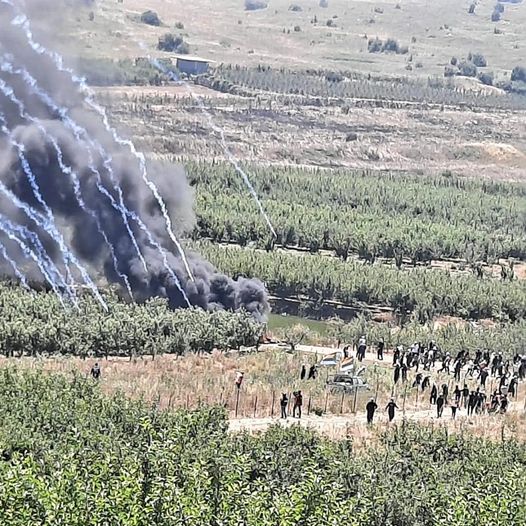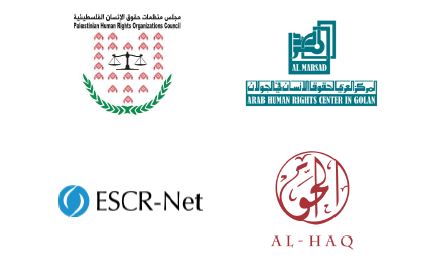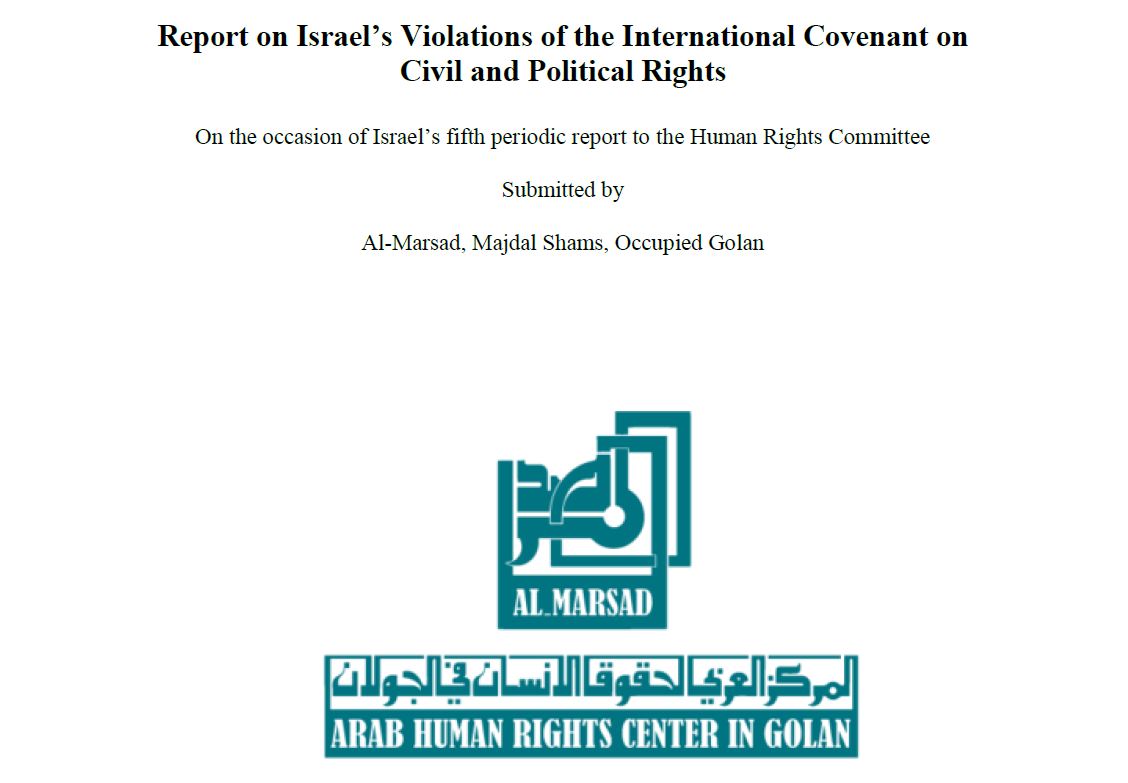
Al-Marsad submits report to UN Human Rights Committee
Earlier this month, Al-Marsad submitted a ‘List of Issues’ report to the United Nations Human Rights Committee for its 2018 review of Israel’s implementation of the International Covenant on Civil and Political Rights (ICCPR).
Al Marsad submitted the report – prepared by Cornell Law School International Human Rights Clinic – to guide the pre-session Working Group in preparing the list of issues regarding Israel’s implementation of the ICCPR. The report is a summary of ongoing ICCPR violations that affect the Syrian population living in the occupied Syrian Golan, including: the right to self-determination (Article 1); the right against discriminatory treatment (Articles 2 and 26); the right to an effective remedy (Article 2); the right to life (Article 6); the right to freedom of movement (Article 12); the right to family (Articles 17 and 23); and cultural, religious, and language rights of minorities
(Article 27).
The full report is available by clicking here. In brief, it describes that:
Background and settlements
During the 1967 Arab-Israeli War, Israel occupied 1,230 km2 of the Syrian Golan; the current area of Israeli occupation amounts to 1,159 km2 of the Golan’s original 1,750 km2. Approximately 130,000 people, or 95% of the original Syrian population in the occupied Golan, fled or were expelled by the Israeli military following the 1967 war, with only 26,600 Syrians currently remaining in the region. At least 26,261 Israeli settlers currently live in the Golan. On September 3, 2017, Transportation and Intelligence Minister Yisrael Katz announced Israel’s ambition to send another 100,000 settlers to the area.
Israel not only encourages Jewish-Israeli citizens to settle in the Golan, but permits them, once there, to exclude residents from their settlements based on religion or ethnicity. Israeli law allows settlements comprised of 400 houses or less to discriminate between Jewish-Israeli citizens and Arabs. The Israeli government also uses incentives to attract Jewish-Israelis to the Golan and delay or impede the expansion of Syrian communities. For example, Israeli settlers receive up to USD $12,000 as a financial incentive to relocate to the Golan.
Natural resources
Since Israel’s occupation of the Golan, Israel has exploited and pillaged the natural resources belonging to its Syrian inhabitants. Water, vital to the Golan’s agricultural productivity, has been diverted for Israel’s development and profit. The exploitation of the Golan’s natural resources leaves Syrians unable to compete with Israeli settlers in agriculture and tourism. Israel also profits from Israeli settlers’ agricultural products grown using irrigated water in the Golan. In 2015, Israel made USD $371 million in profits from agricultural products grown and cultivated in the Golan alone. Israel encourages companies to establish their businesses in the Golan to maximize their access to resources and potential for profit; these companies include Eden Springs, Olea Essence, and Golan Heights Winery.
Denial of Building Permits to Syrians and Home Demolition
Many Syrians in the Golan live in fear that the Israeli authorities will destroy their homes or force them to abandon their land. The Israeli government rarely grants Syrians building permits, despite their increasing population. This practice is similar to what Palestinians experience in the Occupied Palestinian Territory, including occupied East Jerusalem.
Prevalence of Landmines and Casualties
Israel established minefields in the Golan after both the 1967 and 1973 Arab-Israeli Wars. These landmines are mostly concentrated around the 1974 ceasefire line. The Golan also contains remnants of minefields laid by Syrian and French forces. Many civilians have been maimed or killed by landmines in the Golan. Israel does not maintain public official records of landmine casualties; as a result, it is difficult to determine the exact number of landmine accidents. Instead, landmine casualties are listed under the larger category of “Victims of Hostile Activities.”A report by Al-Haq, a Palestinian human rights organization, estimates that mines killed 16 and injured 50 Syrians between 1967 and 2000. No statistics are available for the period of 2000–2017. Israeli settlements have not been affected by the minefields to the same degree.
'Undefined' nationality
Most Syrians in the Golan have permanent residency status, with an “undefined” nationality and a “laissez-passer” to travel. This residency, however, may be revoked under certain conditions. Israel reserves the right to revoke the residency of anyone whose “center of life” changes. According to the Israeli government, one’s “center of life” changes if an individual resides outside of Israel seven years or more, or receives a permanent residency or citizenship from a second country. While Jewish people have the inalienable right to return to Israel and acquire citizenship at any time, for non-Jewish people, like Syrians in the Golan, the procedure to regain permanent residency status is onerous, and their requests for residency are often denied.
Cultural Rights: Education and Identity
In 2016, the United Nations Special Committee to Investigate Israeli Practices Affecting the Human Rights of the Palestinian People and Other Arabs of the Occupied Territories observed that the school curriculum in the Golan “sought to ‘diminish’ Syrian identity and culture as well as the civilization and history of the local community.” This practice continues today. History books used in the 2017 educational curriculum of schools in the Golan fail to mention the 1967 war or the occupation of the Golan; they filter the region’s history by presenting the borders of Israel as encompassing the Golan without mentioning the occupation or illegal annexation. Israel’s systemic efforts to alter the ethnic and national identity of the Syrians in the Golan has isolated them from the larger Syrian Arab community.
Related Posts




